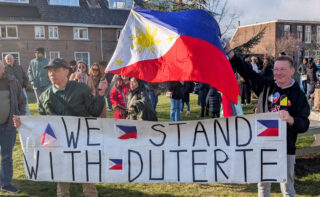On Labor Day, prolific netizen Bernard Ong posted an acute observation on Facebook: “Barangay elections were postponed from October 2016 to October 2017. Then postponed again to May 2018. [President] Duterte’s justification: 40 percent of barangay captains nationwide were involved in illegal drugs. They would use their influence to remain in power.
“Yesterday [the Philippine Drug Enforcement Agency] released a name-and-shame list of barangay officials allegedly involved in drugs: 90 barangay captains and 117 councilors. PDEA lacks evidence to charge them all. Most are only names on a ‘watch list’. There are 42,028 barangays in the Philippines. Ninety suspected captains is only 0.2 percent. That is far less than the 40 percent or 16,811 that Duterte claimed.
“Where are the other 16,721 other suspects? They don’t exist,” Ong wrote.
Indeed, with the PDEA list, it appears the Duterte administration is once again playing fast and loose with facts, as with the first “narco list” Malacañang released in August 2016 that was subsequently proven to contain a host of inaccuracies.
That original list contained the names of more than 150 officials in the police, local governments and judiciary that Mr. Duterte publicly accused of alleged involvement in the drug trade. By this time, three months into his administration, the streets were already awash with mysterious killings every night, carried out against drug suspects either by masked vigilantes or by police in sweeping drug raids. To widespread concerns that reading out citizens’ names before the television cameras and accusing them of crimes as such without the corresponding charges was tantamount not only to slander, but also to the very real danger of assassination, the President was unconcerned. He vouched for the veracity of the list, which he said had been vetted thoroughly by law enforcement authorities.
Of the seven judges named in the list, it turned out that one had already died, and another judge supposedly of a court in Dasmariñas, Cavite, had been dismissed from service years before. Those blunders, in part, led Chief Justice Maria Lourdes Sereno to write a letter to Mr. Duterte cautioning against his “premature announcement.” That show of temerity would apparently rankle Mr. Duterte so much that, two years later, the country finds itself at a troubling constitutional impasse, with Malacañang and its allies hell-bent on impeaching Sereno by means fair or foul.
So much trouble arising from so dubious a list. And now, a repeat—as if nothing has been learned from the earlier debacle. PDEA’s release of a “validated narco list” containing the names of over a hundred local officials has immediately raised questions about its basic accuracy. As ABS-CBN News reported, a barangay kagawad in Tanauan, Batangas, named in the list has been dead for more than a year. The barangay captain of Pleasant Hills, Mandaluyong, was also included, despite his district having been officially awarded as “drug-free” in 2008, 2016 and 2017. Even the Department of the Interior and Local Government in Bicol pointed out that some of those listed were already in jail, while other names contained misspellings and other mistakes.
The fact that the list’s errors may mean the ruin of reputations, even the potential loss of lives, does not seem to concern PDEA, whose response to such apprehensions has been shockingly nonchalant. Said its chief Aaron Aquino, with the straightest of faces: “Kung nagkataon talagang mali, eh siyempre lahat naman tayo ay tao lang at nagkakamali… (If we’re wrong, we’re just human), and we will try to ask [for] an apology…”
Sen. Panfilo Lacson is right: PDEA’s “narco list” is “dumb and cruel.” It harms both the rights of citizens against unjust accusations, and the very effectiveness of the government’s vaunted campaign against crime.


